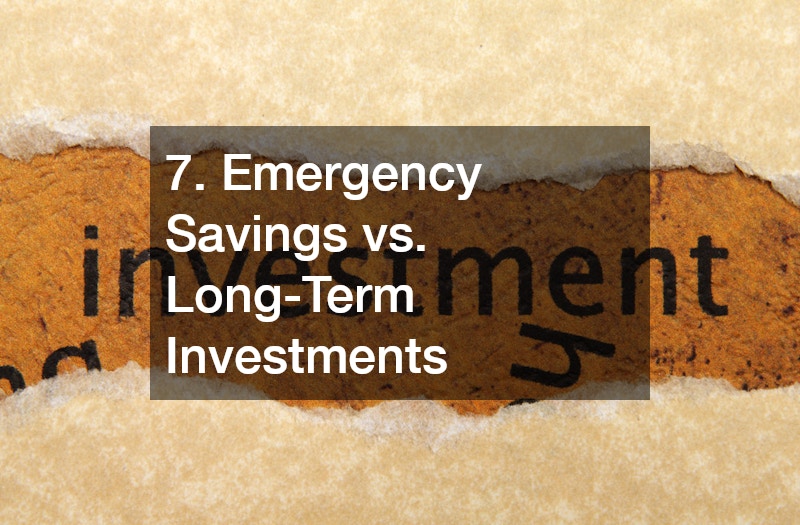
Life is unpredictable, and families can face sudden financial burdens that are difficult to manage without proper preparation. Unexpected medical expenses, job loss, home repairs, or emergencies can create significant financial stress. The good news is that with proactive planning, every family can create a financial safety net that helps them overcome these challenges. This article explores how families can prepare for life’s unexpected costs, focusing on building emergency funds, leveraging insurance, managing debt, and more.
1. Building an Emergency Fund: The First Line of Defense
An emergency fund is a critical financial safety net that can provide immediate relief during unexpected situations. Whether it’s an unexpected medical bill, car repair, or home damage due to a natural disaster, having a dedicated fund for emergencies ensures that families don’t have to rely on credit cards or loans to cover these costs.
How Much Should You Save?
Most financial experts recommend saving enough to cover three to six months of living expenses. This amount will vary depending on your family size, lifestyle, and monthly obligations. However, it’s important to start with a smaller, more attainable goal, like saving $1,000, and then gradually work toward a more robust fund.
Where Should You Store the Emergency Fund?
The key to an emergency fund is accessibility. It’s important to keep the money in an account that’s easy to access but not too easy to withdraw from. High-yield savings accounts or money market accounts are excellent options because they offer competitive interest rates while keeping the money liquid in case of emergencies.
2. The Role of Insurance in Safeguarding Your Family

Insurance plays a crucial role in protecting families from financial hardship during unexpected events. Without the right insurance coverage, families can face exorbitant medical bills, loss of income, or catastrophic property damage that can drain their savings and put them in debt. With the right coverage, however, you can safeguard your family’s financial future and ensure that life’s unexpected events don’t lead to long-term financial instability. Here are the types of insurance to consider:
Health Insurance:
Health insurance ensures that medical expenses don’t deplete savings or put families in debt due to unexpected health conditions or accidents. Medical costs can be overwhelming, especially in the case of chronic conditions or emergency care, so having a health insurance plan is essential. This coverage typically includes hospitalization, doctor visits, prescriptions, and preventive care.
For families, health insurance can provide coverage for illness treatments, ensuring that your family can receive necessary care without incurring crippling expenses. Having comprehensive coverage can help mitigate the costs of surgeries, hospital stays, and long-term treatments that can arise unexpectedly.
Life Insurance:
Life insurance provides financial support to your family in the event of your death, ensuring that they can continue living comfortably without the burden of funeral cost or lost income. This coverage can help replace your income, pay off debts, or ensure that your children’s education and other family needs are met in your absence. Life insurance can also cover funeral planning expenses, which can be substantial and often unexpected.
A life insurance policy may offer several options, such as term life insurance, which covers you for a set period, or whole life insurance, which provides coverage for your entire life and can accumulate cash value. By securing a life insurance policy, you ensure that your loved ones are not left financially vulnerable during an already difficult time.
Homeowners Insurance:
Homeowners insurance protects your home and belongings from damage due to accidents, fires, theft, or natural disasters. This type of insurance can cover the cost of repairs or replacement of your home and personal property, helping you avoid the financial burden of rebuilding or replacing damaged items.
Depending on the policy, homeowners insurance may also cover additional living expenses if your home becomes uninhabitable due to damage, giving your family the financial support needed during this time of uncertainty.
Disability Insurance:
Disability insurance offers income replacement in the event that you are unable to work due to illness or injury. This coverage is vital for ensuring that your family can continue to pay bills, cover living expenses, and maintain their lifestyle while you recover. Depending on the policy, disability insurance may cover both short-term and long-term disabilities, with varying payout amounts and durations.
This type of insurance is particularly important if you are the primary breadwinner or have significant financial responsibilities. By providing a financial cushion during a period when you may be unable to earn income, disability insurance helps to minimize the impact on your family’s overall financial stability.
3. Budgeting for the Unexpected
A well-organized budget is a key tool for financial security. It helps families track their income, expenses, and savings, but it can also prepare them for life’s unexpected costs. Whether it’s an emergency medical expense, a home repair, or a sudden job loss, having a budget that accounts for the unexpected can make all the difference in maintaining your financial stability. When creating a budget, families should factor in an “emergency” category, which accounts for those unplanned expenses, ensuring that unexpected costs don’t derail their financial goals.
Natural disasters, such as hurricanes, floods, or wildfires, can strike at any time and often come with significant costs. These events can cause widespread damage to homes, businesses, and infrastructure, leading to the need for immediate repairs and recovery. The financial toll of such disasters can be overwhelming, especially if you’re unprepared for the high costs associated with cleanup, rebuilding, and restoring your property. Having a budget that accounts for these potential expenses is critical for minimizing the financial impact.
Use the 50/30/20 Rule:
The 50/30/20 rule is a straightforward method for managing your finances. Allocate 50% of your income to necessities such as housing, utilities, and groceries. 30% should go toward discretionary spending like entertainment and dining out. Finally, reserve 20% for savings and debt repayment. Within this 20%, be sure to include contributions to your emergency fund, as it acts as a financial buffer for life’s surprises.
Plan for Irregular Expenses:
While regular expenses like rent or mortgage payments are easy to predict, irregular expenses can catch families off guard. These might include annual or semi-annual bills such as insurance premiums, car maintenance, or home repairs. To avoid the stress of scrambling for funds when these expenses arise, set aside money each month in a separate category for these irregular costs. This way, when an unexpected expense such as fire damage restoration is needed, you won’t have to dip into your emergency savings or rely on credit.
Track and Adjust:
Regularly reviewing your budget is essential for staying on track. Life can be unpredictable, and unexpected expenses will arise. If an unplanned cost comes up, such as medical bills or home repairs after a storm, adjust your budget to accommodate these expenses. For example, storm damage services might be necessary after a particularly severe weather event, and having funds set aside can help you manage these expenses without putting your family in financial jeopardy.
4. Debt Management

Managing debt is essential for ensuring financial stability in the long term. While debt can be a useful tool for purchasing a home or paying for education, high levels of consumer debt can become a major obstacle when preparing for emergencies. Excessive debt can make it harder to save and can create financial stress when unexpected costs arise. Effective debt management can prevent families from being overwhelmed by their financial obligations and allow them to focus on preparing for the future.
Pay Off High-Interest Debt First:
Prioritize paying off credit card debt or personal loans with high interest rates. These types of debt can quickly spiral out of control, making it difficult to manage your finances and build savings. By tackling high-interest debt first, you free up money for savings and emergencies, and reduce the financial burden that comes with maintaining large balances.
Consolidate or Refinance Debt:
If you have multiple debts, consider consolidating them into a single loan with a lower interest rate. This can simplify your monthly payments and potentially lower your overall interest costs. Refinancing is another option for reducing interest rates on existing loans, which can improve your cash flow and make it easier to manage payments.
Avoid Taking on New Debt:
Resist the temptation to take on new debt, especially for discretionary expenses. Accumulating more debt will only increase your financial strain and make it harder to prepare for unexpected events. Instead, focus on paying off existing debts and building your savings for emergencies.
Seek Professional Help If Needed:
If you’re struggling to manage debt or feel overwhelmed by your financial situation, consider reaching out to a credit debt counseling service. These services can provide expert advice on budgeting, debt management, and negotiating with creditors to create a manageable plan for paying off your debts.
5. Setting Up a Backup Income Stream

In today’s rapidly changing economy, relying solely on a single source of income can be risky. A backup income stream provides a cushion in case of job loss, unexpected illness, or a sudden reduction in hours. There are several ways families can create a secondary income stream to help safeguard against financial uncertainty.
Freelancing or Side Gigs:
If you have marketable skills, consider freelancing in your spare time. Popular side gigs include writing, graphic design, tutoring, and rideshare driving.
Passive Income:
Invest in assets that generate passive income, such as rental properties, dividend-paying stocks, or creating digital products like eBooks or courses that can be sold online.
Start a Small Business:
Use your skills or hobbies to start a small business that can bring in additional income. Whether it’s opening an online store or offering services in your local community, a small business can be a reliable backup income source.
Having additional income sources can provide peace of mind and reduce reliance on your primary job, especially in times of economic uncertainty.
6. Establishing a Family Financial Plan
A family financial plan is an essential tool for long-term financial success. It involves setting clear financial goals, prioritizing savings, and creating a roadmap to achieve those goals. A well-crafted plan helps families manage everyday expenses and ensures they are prepared for unexpected financial challenges. By aligning your financial priorities and planning for the future, you can make more informed decisions and safeguard your family’s financial well-being.
Define Your Financial Goals:
Start by setting clear short-term and long-term goals. These could include buying a home, saving for college, or retiring comfortably. It’s also important to consider other significant goals, such as saving for private schools or planning for major life events. Setting specific and measurable goals ensures that your financial plan is purposeful and achievable.
Assess Your Current Financial Situation:
Take stock of your current income, expenses, savings, and debt. This helps you understand where you stand financially and gives you a baseline from which to work. Knowing your net worth and how much you’re spending versus saving is crucial for adjusting your financial behaviors and improving your situation.
Create a Strategy to Achieve Your Goals:
Develop a step-by-step plan that includes strategies for paying off debt, increasing savings, and investing in your future. Factor in things like emergency savings, retirement accounts, and education savings for children. Regularly review and adjust your plan as needed to stay on track, ensuring that you’re adapting to changes in income, family needs, or unexpected financial challenges.
7. Emergency Savings vs. Long-Term Investments

While emergency savings are essential for short-term financial security, long-term investments play a crucial role in building wealth and ensuring future financial stability. It’s important to strike the right balance between saving for immediate needs and investing for long-term goals.
Emergency Savings:
These funds are intended for urgent, unforeseen expenses and should be easily accessible in a liquid account. The focus is on security, not growth. The goal is to have enough savings to cover three to six months of expenses in case of emergencies. This provides a safety net in case of job loss, medical emergencies, or other financial disruptions.
To make sure these funds remain readily available, consider using a high-yield savings account or money market account. It’s also important to resist the temptation to dip into these savings for non-emergencies, as they are crucial for maintaining financial stability when life takes an unexpected turn.
Long-Term Investments:
Investments like stocks, bonds, mutual funds, and retirement accounts are meant to build wealth over time. These funds are generally less accessible in the short term but offer the potential for growth, which is essential for securing your family’s future. Long-term investments allow your money to grow through compounded returns, helping to build assets that can support goals like retirement or funding a child’s education.
While these investments carry some risk, they typically offer higher returns over the long term compared to traditional savings accounts. It’s important to regularly review and adjust your investment portfolio based on your family’s changing goals and risk tolerance.
8. Creating a Will and Estate Plan
Planning for the future is an essential part of financial safety. A will and estate plan ensure that your assets are distributed according to your wishes and can prevent potential legal and financial issues for your family after your passing. These documents are vital for minimizing confusion and protecting the interests of your loved ones during a difficult time.
Why You Need a Will:
- Legal clarity: A will ensures that your assets, such as property, savings, and investments, go to the individuals or organizations you choose. It provides clear instructions to your heirs and reduces the likelihood of legal disputes after your death.
- Prevent family disputes: Having a clear plan in place can prevent conflicts among family members regarding your estate. Without a will, state laws will determine the distribution of your assets, which may not align with your wishes.
- Guardianship for children: A will can also specify who will care for your children if you and your partner are no longer able to do so. This ensures that your children are placed with trusted family members or friends, reducing potential uncertainty for their future.
An estate plan is equally important and should include considerations for health care directives, power of attorney, and other important legal documents that provide guidance in case of incapacitation. To ensure your plan is legally sound and comprehensive, consult with an estate planning attorney who specializes in these matters. Estate planning lawyers can provide expert guidance to help you navigate the complexities of creating a trust, minimizing taxes, and ensuring that all aspects of your estate plan are in place.
9. Navigating Unexpected Job Loss or Income Disruptions
Job loss or a significant reduction in income can be a major financial setback. While no one can predict when this will happen, there are steps families can take to prepare for income disruptions and minimize the impact.
How to Prepare for Job Loss:
- Build an emergency fund: As mentioned, having three to six months’ worth of living expenses saved can provide a financial buffer during unemployment.
- Understand your unemployment benefits: Familiarize yourself with the unemployment benefits available in your area and how to apply for them.
- Explore other income options: Consider part-time or freelance work while searching for a new job to maintain income and avoid financial strain.
If you find yourself facing an unexpected job loss, it’s important to know your rights. Consulting with an employment lawyer can help you understand your legal options, including severance packages and potential wrongful termination claims. Having a plan for dealing with job loss can help families stay afloat while they navigate the transition to new employment.
Closing Thoughts
Preparing for life’s unexpected costs requires careful planning, flexibility, and a commitment to securing your family’s financial future. By building an emergency fund, leveraging insurance, budgeting, managing debt, and setting up backup income streams, families can create a robust financial safety net that helps them weather any financial storm.

